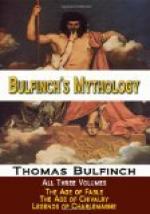Tristram kept himself unknown. He took part in many justs; he fought many combats, in which he covered himself with glory. One day he saw among those recently arrived the king of Ireland, father of the fair Isoude. This prince, accused of treason against his liege sovereign, Arthur, came to Camelot to free himself from the charge. Blaanor, one of the most redoubtable warriors of the Round Table, was his accuser, and Argius, the king, had neither youthful vigor nor strength to encounter him. He must therefore seek a champion to sustain his innocence. But the knights of the Round Table were not at liberty to fight against one another, unless in a quarrel of their own. Argius heard of the great renown of the unknown knight; he also was witness of his exploits. He sought him, and conjured him to adopt his defence, and on his oath declared that he was innocent of the crime of which he was accused. Tristram readily consented, and made himself known to the king, who on his part promised to reward his exertions, if successful, with whatever gift he might ask.
Tristram fought with Blaanor, and overthrew him, and held his life in his power. The fallen warrior called on him to use his right of conquest, and strike the fatal blow. “God forbid,” said Tristram, “that I should take the life of so brave a knight!” He raised him up and restored him to his friends. The judges of the field decided that the king of Ireland was acquitted of the charge against him, and they led Tristram in triumph to his tent. King Argius, full of gratitude, conjured Tristram to accompany him to his kingdom. They departed together, and arrived in Ireland; and the queen, forgetting her resentment for her brother’s death, exhibited to the preserver of her husband’s life nothing but gratitude and good-will.
How happy a moment for Isoude, who knew that her father had promised his deliverer whatever boon he might ask! But the unhappy Tristram gazed on her with despair, at the thought of the cruel oath which bound him. His magnanimous soul subdued the force of his love. He revealed the oath which he had taken, and with trembling voice demanded the fair Isoude for his uncle.
Argius consented, and soon all was prepared for the departure of Isoude. Brengwain, her favorite maid of honor, was to accompany her. On the day of departure the queen took aside this devoted attendant, and told her that she had observed that her daughter and Tristram were attached to one another, and that to avert the bad effects of this inclination she had procured from a powerful fairy a potent philter (love-draught), which she directed Brengwain to administer to Isoude and to King Mark on the evening of their marriage.




